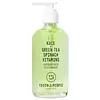What's inside
What's inside
 Key Ingredients
Key Ingredients

 Benefits
Benefits

 Concerns
Concerns

 Ingredients Side-by-side
Ingredients Side-by-side

Cocamidopropyl Hydroxysultaine
CleansingSodium Cocoyl Sarcosinate
CleansingCoco-Betaine
CleansingSodium Laureth Sulfate
CleansingSodium Chloride
MaskingAloe Barbadensis Leaf Extract
EmollientAvena Sativa Kernel Extract
AbrasiveAlgae Extract
EmollientSesamum Indicum Seed Oil
EmollientMedicago Sativa Seed Powder
Skin ConditioningHelianthus Annuus Seedcake
AbrasivePrunus Amygdalus Dulcis Seed Meal
AbrasiveEucalyptus Globulus Leaf Oil
PerfumingSodium Gluconate
Skin ConditioningCopper Gluconate
Skin ConditioningCalcium Gluconate
HumectantMagnesium Gluconate
Skin ConditioningZinc Gluconate
Skin ConditioningTocopheryl Succinate
AntioxidantNiacin
SmoothingSesamum Indicum Seed Powder
Skin ConditioningButylene Glycol
HumectantSucrose
HumectantCaprylyl Glycol
EmollientSodium Bicarbonate
AbrasiveTourmaline
Hexylene Glycol
EmulsifyingParfum
MaskingEDTA
Disodium EDTA
Methylchloroisothiazolinone
PreservativeMethylisothiazolinone
PreservativePhenoxyethanol
PreservativeAlpha-Isomethyl Ionone
PerfumingGeraniol
PerfumingButylphenyl Methylpropional
PerfumingLinalool
PerfumingCI 61570
Cosmetic ColorantCI 19140
Cosmetic ColorantCocamidopropyl Hydroxysultaine, Sodium Cocoyl Sarcosinate, Coco-Betaine, Sodium Laureth Sulfate, Sodium Chloride, Aloe Barbadensis Leaf Extract, Avena Sativa Kernel Extract, Algae Extract, Sesamum Indicum Seed Oil, Medicago Sativa Seed Powder, Helianthus Annuus Seedcake, Prunus Amygdalus Dulcis Seed Meal, Eucalyptus Globulus Leaf Oil, Sodium Gluconate, Copper Gluconate, Calcium Gluconate, Magnesium Gluconate, Zinc Gluconate, Tocopheryl Succinate, Niacin, Sesamum Indicum Seed Powder, Butylene Glycol, Sucrose, Caprylyl Glycol, Sodium Bicarbonate, Tourmaline, Hexylene Glycol, Parfum, EDTA, Disodium EDTA, Methylchloroisothiazolinone, Methylisothiazolinone, Phenoxyethanol, Alpha-Isomethyl Ionone, Geraniol, Butylphenyl Methylpropional, Linalool, CI 61570, CI 19140
Water
Skin ConditioningCocamidopropyl Hydroxysultaine
CleansingSodium Cocoyl Glutamate
CleansingSorbeth-230 Tetraoleate
EmulsifyingPolysorbate 20
EmulsifyingSodium Chloride
MaskingAloe Barbadensis Leaf Juice Powder
Skin ConditioningBrassica Oleracea Acephala Leaf Extract
HumectantSpinacia Oleracea Leaf Extract
Skin ConditioningCamellia Sinensis Leaf Extract
AntimicrobialMedicago Sativa Extract
TonicChamomilla Recutita Flower Extract
MaskingTetrahexyldecyl Ascorbate
AntioxidantGlycerin
HumectantPanthenol
Skin ConditioningTocopheryl Acetate
AntioxidantDecyl Glucoside
CleansingSorbitan Laurate
EmulsifyingTetrasodium Glutamate Diacetate
Gluconolactone
Skin ConditioningEthylhexylglycerin
Skin ConditioningMaltodextrin
AbsorbentCitric Acid
BufferingPhenoxyethanol
PreservativePotassium Sorbate
PreservativeSodium Benzoate
MaskingGardenia Jasminoides Fruit Extract
Cosmetic ColorantParfum
MaskingSodium Hydroxide
BufferingSodium Glycolate
BufferingSodium Formate
BufferingHexyl Cinnamal
PerfumingLinalool
PerfumingLimonene
PerfumingCI 75810
Cosmetic ColorantWater, Cocamidopropyl Hydroxysultaine, Sodium Cocoyl Glutamate, Sorbeth-230 Tetraoleate, Polysorbate 20, Sodium Chloride, Aloe Barbadensis Leaf Juice Powder, Brassica Oleracea Acephala Leaf Extract, Spinacia Oleracea Leaf Extract, Camellia Sinensis Leaf Extract, Medicago Sativa Extract, Chamomilla Recutita Flower Extract, Tetrahexyldecyl Ascorbate, Glycerin, Panthenol, Tocopheryl Acetate, Decyl Glucoside, Sorbitan Laurate, Tetrasodium Glutamate Diacetate, Gluconolactone, Ethylhexylglycerin, Maltodextrin, Citric Acid, Phenoxyethanol, Potassium Sorbate, Sodium Benzoate, Gardenia Jasminoides Fruit Extract, Parfum, Sodium Hydroxide, Sodium Glycolate, Sodium Formate, Hexyl Cinnamal, Linalool, Limonene, CI 75810
 Reviews
Reviews

Ingredients Explained
These ingredients are found in both products.
Ingredients higher up in an ingredient list are typically present in a larger amount.
Cocamidopropyl Hydroxysultaine is a synthetic cleansing agent, though it is derived from coconut oil.
It is used to enhance the texture of products by boosting lather and thickening the texture. As a cleanser, Cocamidopropyl Hydroxysultaine is mild.
Linalool is a fragrance and helps add scent to products. It's derived from common plants such as cinnamon, mint, citrus, and lavender.
Like Limonene, this ingredient oxidizes when exposed to air. Oxidized linalool can cause allergies and skin sensitivity.
This ingredient has a scent that is floral, spicy tropical, and citrus-like.
Learn more about LinaloolParfum is a catch-all term for an ingredient or more that is used to give a scent to products.
Also called "fragrance", this ingredient can be a blend of hundreds of chemicals or plant oils. This means every product with "fragrance" or "parfum" in the ingredients list is a different mixture.
For instance, Habanolide is a proprietary trade name for a specific aroma chemical. When used as a fragrance ingredient in cosmetics, most aroma chemicals fall under the broad labeling category of “FRAGRANCE” or “PARFUM” according to EU and US regulations.
The term 'parfum' or 'fragrance' is not regulated in many countries. In many cases, it is up to the brand to define this term.
For instance, many brands choose to label themselves as "fragrance-free" because they are not using synthetic fragrances. However, their products may still contain ingredients such as essential oils that are considered a fragrance by INCI standards.
One example is Calendula flower extract. Calendula is an essential oil that still imparts a scent or 'fragrance'.
Depending on the blend, the ingredients in the mixture can cause allergies and sensitivities on the skin. Some ingredients that are known EU allergens include linalool and citronellol.
Parfum can also be used to mask or cover an unpleasant scent.
The bottom line is: not all fragrances/parfum/ingredients are created equally. If you are worried about fragrances, we recommend taking a closer look at an ingredient. And of course, we always recommend speaking with a professional.
Learn more about ParfumPhenoxyethanol is a preservative that has germicide, antimicrobial, and aromatic properties. Studies show that phenoxyethanol can prevent microbial growth. By itself, it has a scent that is similar to that of a rose.
It's often used in formulations along with Caprylyl Glycol to preserve the shelf life of products.
Chances are, you eat sodium chloride every day. Sodium Chloride is also known as table salt.
This ingredient has many purposes in skincare: thickener, emulsifier, and exfoliator.
You'll most likely find this ingredient in cleansers where it is used to create a gel-like texture. As an emulsifier, it also prevents ingredients from separating.
There is much debate on whether this ingredient is comedogenic. The short answer - comedogenic ratings don't tell the whole story. Learn more about comegodenic ratings here.
The concensus about this ingredient causing acne seems to be divided. Research is needed to understand if this ingredient does cause acne.
Scrubs may use salt as the primary exfoliating ingredient.
Learn more about Sodium Chloride